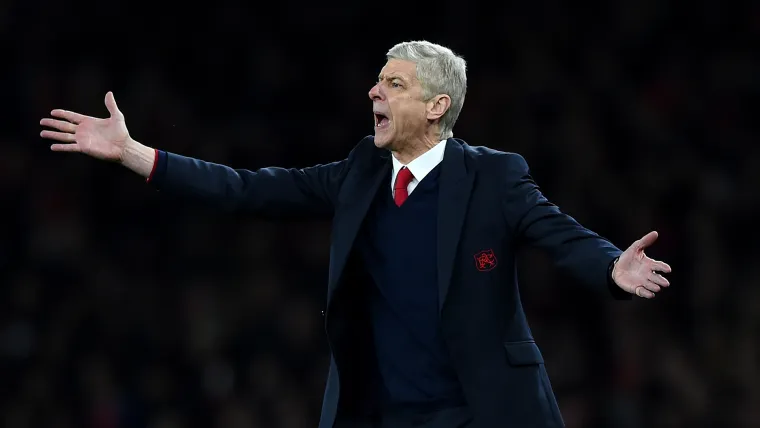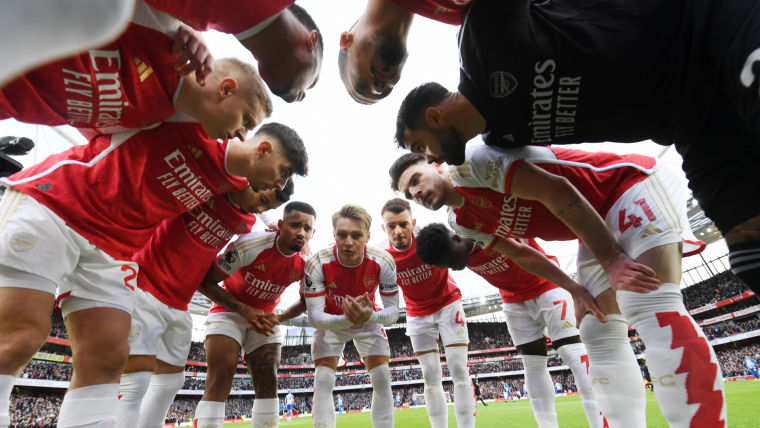Arsenal are aiming to add to their rich history in European football after reaching the Round of 16 of the UEFA Champions League for the first time since the 2016/17 season.
The Gunners first played in the competition back in 1971 and are taking part for the 22nd time, winning more games than they have lost in 16 of those campaigns.
Legendary striker Thierry Henry is their top scorer in the Champions League with 35 goals, followed by another formidable forward, Robin van Persie, with 20.
Did either player win the Champions League with Arsenal, and how has the club fared across the decades? The Sporting News has the details.
MORE: What is Arsenal's record in the Champions League knockouts?
Have Arsenal ever won the Champions League?
Arsenal have never won the Champions League, but they did reach the final with the help of five Henry goals during the 2005/06 season.
They won their group and beat Real Madrid, Juventus and Villarreal during the knockout stage that season, guided by revered former manager Arsene Wenger.
When Sol Campbell gave them a 37th-minute lead in the final against Barcelona in Paris, Arsenal's unbeaten run in the Champions League that season was on course to continue in glorious fashion.
But after Jens Lehmann's earlier red card, Samuel Eto'o equalised in the 76th minute and Juliano Belletti scored the winner five minutes later as Wenger's players narrowly missed out in a finale that was cruel on the English club and their fans at the Stade de France.

Arsenal were ever-present in the knockout stage between the 2003/04 and 2016/17 seasons, recording the second semifinal appearance in their history in 2008/09 when they were knocked out 4-1 on aggregate by Manchester United, who then lost to Barca in the final.
A quarterfinal appearance the following season was Arsenal's fourth at that stage and as good as it got before their seven most recent seasons in the Champions League – each of which ended in Round of 16 exits.
The first of Arsenal's runs to the quarterfinals was in the first of their two appearances in the European Cup – the predecessor to the Champions League – in 1971/72.
The path to the quarterfinals was less arduous that year as the format of the competition only required two victories to reach that stage, and Arsenal rattled in 12 goals across the first two rounds, before losing 3-1 to an Ajax side who would lift the trophy with the help of joint-competition top scorer Johan Cruyff.
| Finish | Achieved | Years |
|---|---|---|
| Final | 1 | 2006 |
| Semifinals | 1 | 2009 |
| Quarterfinals | 6 | 1972, 2001, 2004, 2008, 2010 |
| Round of 16 | 9 | 2005, 2007, 2011-2017 |
| Group Stage | 5 | 1992, 1999, 2000, 2002, 2003 |
Arsenal Champions League history and results
With the exception of a surprise defeat at Lens, which they avenged 6-0 at home, Arsenal made an impressive group-stage return to the Champions League in 2023/24, beating both PSV and Sevilla twice on their way to reaching the knockout stage with a game to spare.
It ensured the Gunners had won at least four games in 16 of their 18 appearances in the Champions League during the 21st century. Before 2023/24, their overall record read: 99 wins, 42 draws and 53 defeats.
| Season | Result | Record (W-D-L) |
|---|---|---|
| 2016/17 | Round of 16 | 4-2-2 |
| 2015/16 | Round of 16 | 3-0-5 |
| 2014/15 | Round of 16 | 6-2-2 |
| 2013/14 | Round of 16 | 6-1-3 |
| 2012/13 | Round of 16 | 4-1-3 |
| 2011/12 | Round of 16 | 6-2-2 |
| 2010/11 | Round of 16 | 5-0-3 |
| 2009/10 | Quarterfinals | 7-2-3 |
| 2008/09 | Runners-up | 5-1-1 |
| 2007/08 | Quarterfinals | 7-3-2 |
| 2006/07 | Round of 16 | 5-3-2 |
| 2005/06 | Final | 8-4-1 |
| 2004/05 | Round of 16 | 3-4-1 |
| 2003/04 | Quarterfinals | 5-2-3 |
| 2002/03* | Second group stage | 4-5-3 |
| 2001/02* | Second group stage | 5-1-6 |
| 2000/01* | Quarterfinals | 7-3-4 |
| 1999/00* | First group stage | 2-2-2 |
| 1998/99** | Group stage | 2-2-2 |
| 1991/92*** | Second round | 1-2-1 |
| 1971/72**** | Quarterfinals | 4-0-2 |
* Three knockout qualifying rounds; two group phases
* Two knockout qualifying rounds; group stage with group winners and best two runners-up advancing
*** Three knockout qualifying rounds
**** Immediate knockout format
UEFA Champions League knockout stage start date
After a two-month break from mid-December, the 2023/24 Champions League will resume with the Round of 16 stage in February 2024.
Teams will play the first legs of their ties on February 13, 14, 20 or 21, with the return matches on March 5, 6, 12 or 13.
Away goals do not count extra in the Champions League anymore, after the rule was dropped before the 2021/22 season, so ties that are level at the end of normal time in the second leg go to extra time and, if necessary, penalties.
1 June 2024. Wembley Stadium. Champions League final.
— UtdDistrict (@UtdDistrict) August 31, 2023
Who will be there? ⚽️ pic.twitter.com/QhZWQYnoc3
How to watch Champions League around the world
| TV channel | Streaming | |
|---|---|---|
| Australia | — | Stan Sport |
| Canada | — | DAZN |
| India | Sony TEN | JioTV, Sony LIV |
| UK | TNT Sport | TNT Sport site/app, discovery+ |
| USA | CBS, CBSSN, Univision, TUDN, UniMas |
Fubo, Paramount+, ViX or ViX+ |
| India | SonySports | SonyLIV |
UK: Matches are broadcast on TNT Sports and streamed on TNT Sports site and app platforms, including discovery+.
USA: Matches are available to stream on Paramount+ (English) and ViX (Spanish) for subscribers, and when matches are televised on CBS or Univision channels, those are also streamed on Fubo.
Canada: Every Champions League game streams live on DAZN.
Australia: Every match from the UEFA Champions League, UEFA Europa League and UEFA Europa Conference League streams on Stan Sport ad-free, live and on demand.
India: The SonySports network carries live coverage for audiences in India.

